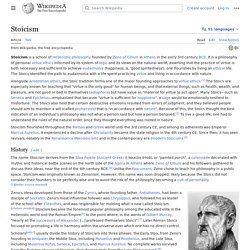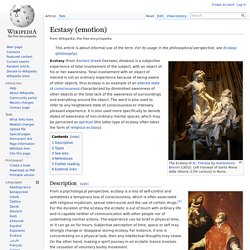

Stoicism. School of Hellenistic Greek philosophy Stoicism is a school of Hellenistic philosophy which was founded by Zeno of Citium, in Athens, in the early 3rd century BC.

Stoicism is a philosophy of personal ethics informed by its system of logic and its views on the natural world. According to its teachings, as social beings, the path to eudaimonia (happiness) for humans is found in accepting the moment as it presents itself, by not allowing oneself to be controlled by the desire for pleasure or fear of pain, by using one's mind to understand the world and to do one's part in nature's plan, and by working together and treating others fairly and justly. Stoicism flourished throughout the Roman and Greek world until the 3rd century AD, and among its adherents was Emperor Marcus Aurelius. It experienced a decline after Christianity became the state religion in the 4th century AD. Sage (sophos) Gods and sages, because they are wise;senseless people, because they think they are wise.

The position of the philosopher is between these two groups. The philosopher is not wise; but, aware that he is not wise, seeks wisdom, and loves wisdom. This distinction between the philosopher and the sage played an important part in Stoic philosophy that developed after Plato.[1] The Stoics conceived of the sage as an individual beyond any possibility of harm from fate. The life difficulties faced by other humans (illness, poverty, criticism and bad reputation, death, etc.) could not cause a sage any sorrow, and the life circumstances sought by other people (good health, wealth, praise and fame, long life, etc.) were regarded by the Stoic sage as unnecessary externals.
Ecstasy (emotion) Ecstasy (from Ancient Greek ἔκστασις ékstasis) is a subjective experience of total involvement of the subject, with an object of his or her awareness.

Total involvement with an object of interest is not an ordinary experience because of being aware of other objects, thus ecstasy is an example of an altered state of consciousness characterized by diminished awareness of other objects or the total lack of the awareness of surroundings and everything around the object. The word is also used to refer to any heightened state of consciousness or intensely pleasant experience.